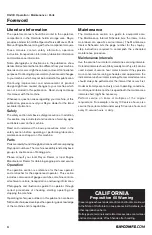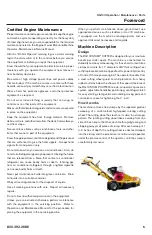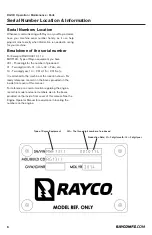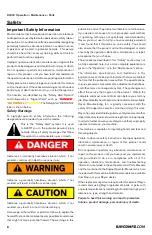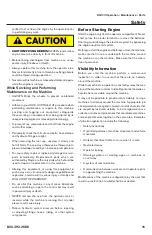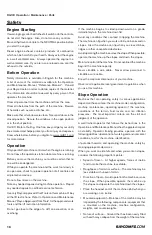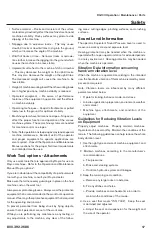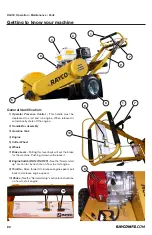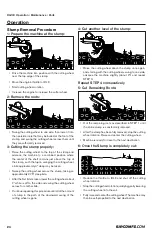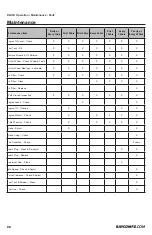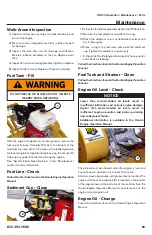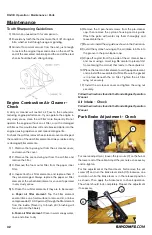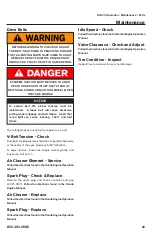
RG13II Operation • Maintenance • Parts
18
Safety
b. Inspect and maintain the seat suspension and
adjustment mechanisms.
5. Perform the following operations smoothly.
a. Steer
b. Brake
c. Accelerate
d. Shift the gears
6. Move the attachments smoothly.
7. Adjust the machine speed and the route in order to
minimize the vibration level.
a. Drive around obstacles and rough terrain.
b. Slow down when it is necessary to go over rough
terrain.
8. Minimize vibrations for a long work cycle or a long travel
distance.
a. Haul the machines between workplaces.
Guards (Operator Protection)
There are different types of guards that are used to protect
the operator. The machine and the machine application
determines the type of guard that should be used.
A daily inspection of the guards is required in order to check
for structures that are bent, cracked or loose. Never operate
a machine with a damaged structure.
The operator becomes exposed to a hazardous situation if the
machine is used improperly or if poor operating techniques
are used. This situation can occur even though a machine is
equipment with an appropriate protective guard.
Other Guards (If Equipped)
Protection from flying object and/or falling objects is required
for special applications. Logging applications and demolition
applications are two examples that require special protection.
A front guard needs to be installed when a work tool that
creates flying objects is used. Mesh front guards that are
approved by Rayco or polycarbonate front guards that are
approved by Rayco are available for machines with a cab or
an open canopy. On machines that are equipped with cabs,
the windshield should also be closed. Safety glasses are
recommended when flying hazards exist for machines with
cabs and machines with open canopies.
If the work material extends above the cab, top guards and
front guards should be used.
Additional guards may be required for specific applications
or work tools. The Operation and Maintenance Manual
for your machine or your work tool will provide specific
requirements for the guards. Consult your Rayco dealer for
additional information.
Precautions for Welding on FRAME
with ENGINE/MACHINE Electronic
Control Unit (ECU)
Important: ALWAYS disconnect Electronic Control Unit (ECU)
connectors and engine control system-to-machine ground
before welding on engine or machine.
High currents or electrostatic discharge in electronic
components from welding may cause permanent damage
Safety Decals
The safety decals located on this machine contain useful
and important information which will help you to operate
your machine safely. The complete decal kit and location of
each decal is given in the “Parts” manual. For your protection,
familiarize yourself with each label until you completely
understand the warning intended. Do not violate any such
warnings!
Keep all decals in place and in good condition:
• Use soap and water to keep decals clean. DO NOT
use mineral spirits, abrasive cleaners or other similar
cleaners which will damage the decals.
• Replace any damaged or missing decals. Before
attaching decals, the surface temperature of the metal
must be at least 40 degrees. The metal should also be
clean and dry before attaching the decal.
• If a machine component to which a decal is attached is
replaced, be sure to replace the decal as well.
• Replacement decals may be purchased from Rayco Mfg
or your Rayco dealer.
LOCK-Out / Tag-Out Guidelines
Always practice lock out tag out procedures when working
on this machine.
Locking and tagging out equipment safeguards those working
on the equipment from being injured by its unexpected
energized or releasing stored energy. This section summarizes
the applicable requirements for lockout/ tag out procedures,
and its intent to comply with OSHA regulations.
Lock Out Procedure
• All affected persons are to be notified that the equipment
will be off and locked out.
• All energy sources for the equipment should be identified.
• The equipment shall be shut off or otherwise deenergized,
being careful to de-energize all energy sources. This
includes all valves, switches, breakers, or other controls

